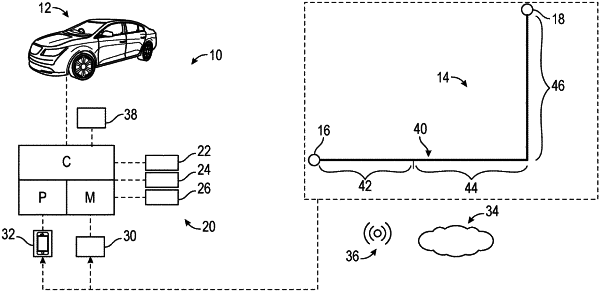| CPC G01C 21/3469 (2013.01) [G01C 21/3484 (2013.01); G01C 21/3691 (2013.01)] | 16 Claims |

|
1. A system for predicting energy consumption by a vehicle, the system comprising:
a controller adapted to receive a route plan for the vehicle for a trip, the controller having a processor and tangible, non-transitory memory on which instructions are recorded,
a plurality of machine learning modules selectively executable by the controller, including a behavior predictor, a driving consumption predictor and an auxiliary consumption predictor, the plurality of machine learning modules including at least two types of machine learning models;
a feature extractor adapted to extract a first set of features, the trip having a number of trip segments such that the first set of features includes an average traffic speed of each of the trip segments in the trip;
wherein the behavior predictor is adapted to receive the average traffic speed and generate a predicted average vehicle speed for each of the trip segments, the predicted average vehicle speed being based in part on the average traffic speed, a squared value of the average traffic speed and a set of learned coefficients;
wherein the predicted average vehicle speed (AVS) is used to calculate at least two hinge functions, including MAX (0, AVS) and MAX (0, AVS−v1), where v1 is a predetermined speed;
wherein the at least two hinge functions are employed to select an aerodynamic model for the driving consumption predictor, the aerodynamic model being based on at least one of surface friction and/or wind resistance encountered by the vehicle;
wherein the driving consumption predictor is adapted to predict a primary energy consumed for propelling the vehicle based in part on the route plan and the predicted average vehicle speed;
wherein the auxiliary consumption predictor is adapted to predict a secondary energy consumed by the vehicle for non-propulsion purposes;
wherein the controller is adapted to predict a total energy consumed by the vehicle during the trip by executing the plurality of machine learning modules;
wherein the controller is adapted to control the vehicle based in part on the predicted total energy consumption, including using the predicted total energy consumption for performance monitoring of the vehicle.
|